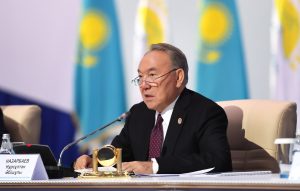Kazakhstan’s First President Nursultan Nazarbayev, who turns 80 next month, has tested positive for the novel coronavirus, according to his own press service. The brief statement released on June 18 said “There is no cause for concern” and noted that Nazarbayev “continues to work remotely.”
In one Kazakh media report, Nazarbayev’s press secretary, Aidos Ukibay, said that from the beginning of June Nazarbayev had had a “very busy work schedule,” including receiving officials and “bilateral negotiations.” Nazarbayev, he said, also gave a number of interviews to both domestic and foreign media.
Officially Elbasy — Leader of the Nation — Nazarbayev resigned from the presidency in March 2019, but retained not only his formal titles, including “First President,” but significant positions of power. Nazarbayev is lifetime chair of Kazakhstan’s Security Council, and routinely meets with foreign dignitaries.
While President Kassym-Jomart Tokayev, who succeeded Nazarbayev last year, has been photographed repeatedly donning a face mask as he goes about his work, Nazarbayev has not.
On Twitter, the AFP’s Central Asia correspondent Chris Rickleton quipped: “Nursultan Nomaskabayev” in sharing a photo from June 3 of Nazarbayev shaking hands with the United Arab Emirates’ Ambassador Mohammad al-Jaber; neither man is wearing a mask. “What example does this set for other Kazakh citizens, especially those in his own ‘high risk’ age group?” Rickleton commented.
Kazakhstan, which recorded its first coronavirus case in mid-March, has since registered more than 15,877, according to the state’s official dashboard. But there has been recent debate over the veracity of the Central Asian state’s COVID-19 statistics. On June 3, as Eurasianet reported, the Kazakh Health Ministry stopped including asymptomatic cases in its topline figures. The data on asymptomatic cases is still released, but not included in the “official” count. The Health Ministry’s logic was that the official number should reflect patients who require treatment. But, as is common knowledge, asymptomatic individuals can still spread the virus even if they do not require hospitalization. A true representation of the virus’ strength in a given community would arguably include all those who have been confirmed to carry and have the opportunity to further spread the infection.
Also debated has been the official death toll, standing now at 100 people. Radio Azattyq, the Kazakh service of RFE/RL, reported differences noted by local reporters in the numbers of dead announced and the numbers of graves counted in sites specifically designated for COVID-19 victims. There has, in addition to the change in counting noted above, been a change in labeling COVID-19 deaths. As Eurasianet explained:
Kazakhstan has followed Russia’s move to publish rosier data. On May 27, Moscow began excluding asymptomatic patients from its total. Also like Russia, Kazakhstan now separates patients who died ‘from COVID-19’ and ‘with COVID-19,’ which is used when the deceased had an underlying health condition. This second figure is not reported to international bodies.
Kazakhstan enacted a state of emergency and strict curfew and quarantine rules on Match 16. It lifted the state of emergency on May 11, along with peeling back some restrictions in some jurisdictions. Nevertheless, the number of cases has continued to grow. For example, in early June the number of cases at one of Kazakhstan’s largest oil fields topped 1,000.
According to RFE/RL, on June 18 Nur-Sultan issued an order for the re-application of restrictions for the coming weekend in the capital and Almaty, along with the country’s four other largest cities —Karaganda, Shymkent, Pavlodar, and Ekibastuz. Parks, entertainment venues, markets, malls, and other sites will be closed and citizens over 65 have been barred from leaving their homes.
Nazarbayev is not the first high-level official in Kazakhstan to test positive for COVID-19. On June 7, Tokayev’s press secretary announced via Facebook that he’d tested positive for COVID-19. A week later, on June 14, Health Minister Yelzhan Birtanov announced he had tested positive and developed symptoms and on June 17, speaker of the lower house of parliament, Nurlan Nigmatulin, was announced to have tested positive. As high-ranking members of the government self-isolate, talk of a second lockdown looms.
As AFP reported, Tokayev recently accepted an invitation from Russian President Vladimir Putin to attend a military parade on June 24 in Moscow marking the end of World War II. Whether that trip remains in the cards is an open question as the virus continues to spread in both countries.
































